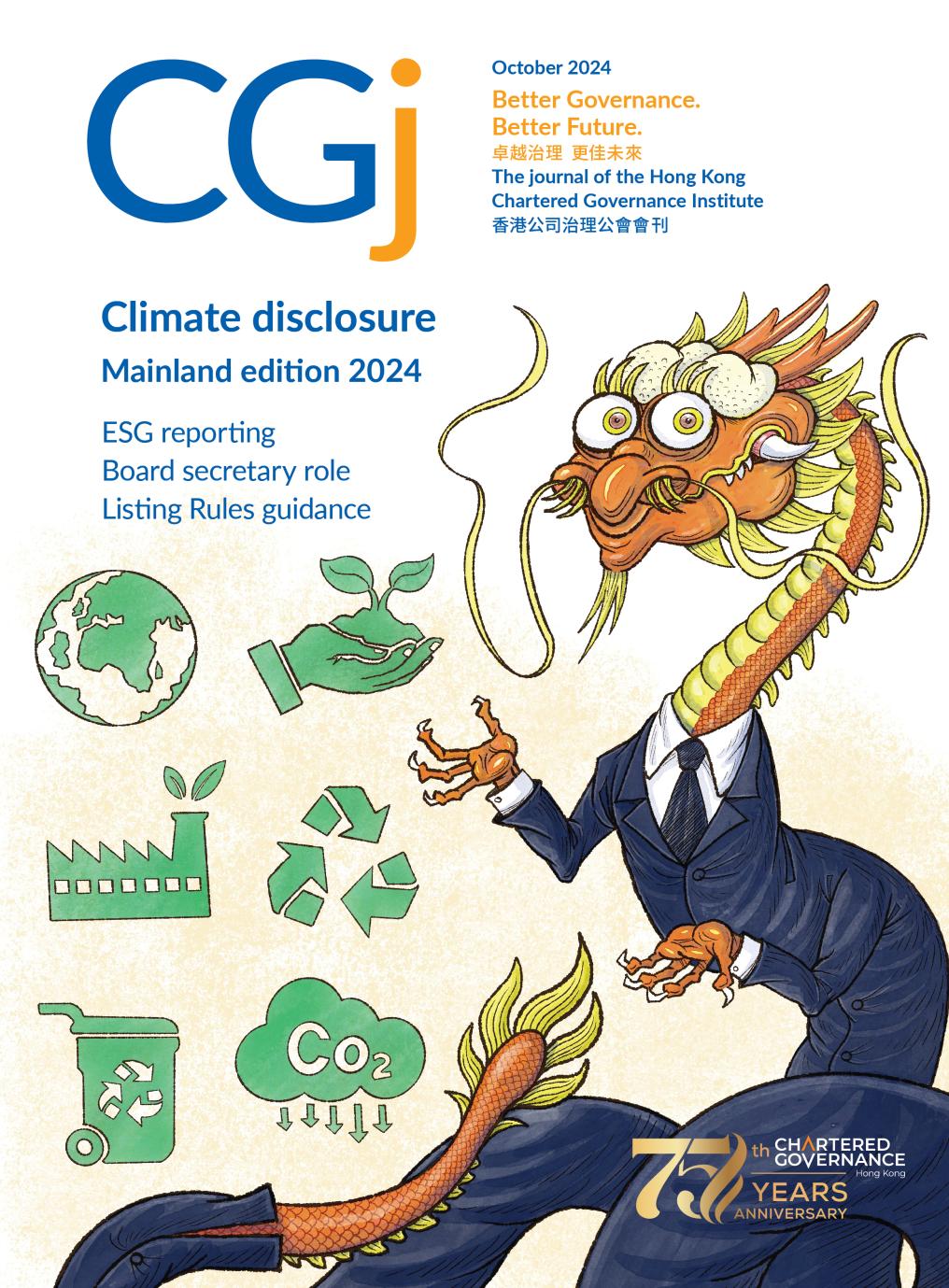
Understanding Chapter 13
Essential continuing obligations for listed companies
CGj reviews the first session of the Institute’s newly launched Listing Rules Foundation Course Series, which focused on the essential continuing compliance obligations under Chapter 13 of the Listing Rules.
Highlights
- the compliance requirements outlined in Chapter 13 aim to maintain a fair and orderly market, and to ensure all users of the market have simultaneous access to the same information
- companies must be well prepared with contingency plans, clear authorisation protocols and efficient communication channels to navigate challenges effectively
- the seminar underscored the importance of compliance and transparency in fundraising decisions
Companies listed on The Stock Exchange of Hong Kong Limited (the Exchange) must comply with the Listing Rules to maintain their market status and protect investor interests. In June this year, to equip governance professionals with the knowledge and skills necessary to navigate the key compliance requirements under the Listing Rules, the Institute launched the Listing Rules Foundation Course Series, comprising three seminars in Cantonese (with English presentation materials), held at the HKEX Connect Hall and online.
This article provides an overview of the inaugural session of the series, held on 28 June 2024, highlighting how companies can proactively manage potential risks and maintain smooth operations under Chapter 13 of the Main Board Listing Rules. At the seminar, industry experts and regulatory representatives shared their insights on Chapter 13, detailing the continuing obligations that listed companies must fulfil after their listing. The compliance requirements outlined in Chapter 13 aim to maintain a fair and orderly market, and to ensure all users of the market have simultaneous access to the same information. These rules seek to ensure transparency, fair play and good governance, fostering a stable and trustworthy market environment.
“the compliance requirements outlined in Chapter 13… seek to ensure transparency, fair play and good governance, fostering a stable and trustworthy market environment”
Strategies and considerations for fundraising
The seminar also provided valuable insights into the various forms of fundraising and the strategic considerations boards must make during these processes.
Under the current Listing Rules, a listed issuer must offer its securities to all existing shareholders in issues of equity securities, unless it obtains approval from its shareholders under a specific mandate or a general mandate on a non pre-emptive basis. A pre-emptive right is a right of existing shareholders to purchase newly issued shares before they are offered to the general public. This right is meant to protect current shareholders from any dilution in value or control. Shareholders who do not wish to participate in the rights issue can be compensated for their losses with nil-paid rights.

Alson Law FCG HKFCG, Company Secretary and Head of Secretarial Department, The Bank of East Asia Ltd, underscored the importance of compliance and transparency in fundraising decisions. ‘Boards must understand the funding rules, comply with all relevant regulations, and inform shareholders and the market about the fundraising process and its intended use,’ he stated. By balancing financial needs with regulatory compliance and shareholder protection, maintaining transparency and fostering strong investor relations, companies can effectively navigate the complexities of fundraising and leverage their listing status for growth and success.
Benita Yu FCG HKFCG, Institute Technical Consultation Panel member and Senior Partner, Slaughter and May, also addressed the significance of post-listing fundraising and the various methods available. ‘Listing in Hong Kong is just the beginning – raising funds post-listing is crucial and beneficial,’ she said. She pointed out that placings are a popular and efficient method due to their speed and simplicity. ‘Placings are advantageous because you don’t need a prospectus. If you have enough market recognition and investor coverage, you can raise substantial funds overnight,’ she explained.
Ms Yu also highlighted the regulatory safeguards aimed at ensuring that shareholder interests are protected, such as the limitation of the dilution to no more than 20% of the total issued shares in general mandates (and at not more than a 20% discount from the benchmarked price).
It was also noted during the session that as part of investor relations management, issuers should maintain transparent communication about the company’s strategy and plans. Regular investor engagement helps investors understand the company’s strategy, thereby increasing the likelihood of successful fundraising when needed.
Profit alerts and warnings
Seminar speakers also shed light on the complexities involved in issuing effective profit alerts and warnings. Mr Law specified that there is no general rule for such disclosures, and companies should consider market expectations and analyst predictions. ‘When your company’s performance has a significant gap compared with market predictions, it may be a valid reason to issue a profit alert or warning,’ he explained.
He added that even in the absence of analyst predictions, companies should consider their historical performance and trends. ‘A significant gap in profit or loss compared with past trends is a sign that an alert or warning might be necessary,’ he said.
“a significant gap in profit or loss compared with past trends is a sign that an alert or warning might be necessary”
Alson Law FCG HKFCG
Company Secretary and Head of Secretarial Department, The Bank of East Asia Ltd
It was suggested during the session that companies can simply ask themselves the question: ‘If you were to tell someone about your current performance, would it provoke a significant market reaction?’ If the answer is yes, then the information likely constitutes inside information that requires an announcement.
Stella Lo FCG HKFCG(PE), Institute Vice-President and Group Company Secretary, Guoco Group, pointed out that companies often have difficulties in judging when to issue an alert or warning. She highlighted the guidelines by the Securities and Futures Commission (SFC) on inside information and noted the common misconception that a 30% profit movement automatically necessitates an advance announcement. She suggested that companies conduct an assessment exercise to understand the reasons behind their profit changes and compare them to previous trends. ‘If your profit change is due to reasons not previously mentioned in your disclosures, even if it’s below 30%, an announcement might still be necessary,’ she noted.
Trading halts
Speakers also provided valuable insights into when and how trading halts should be considered to ensure market integrity without unduly disrupting shareholder trading activities.
Trading halts serve to protect investors by allowing trading on a fully informed basis. By creating a break in trading, they aim to avert the risk of creating a false, unfair or disorderly market or where such conditions are already emerging. At the same time, to ensure the proper functioning of the market, any trading halt should be kept to the minimum period necessary to ensure investors are not denied reasonable access to the market.
Ms Lo pointed out the logistical challenges faced by boards with members across different time zones. This complexity necessitates robust processes and prearranged authorisations to ensure timely decisions. Mr Law emphasised the importance of having clear protocols and authorised personnel to make swift decisions regarding trading halts.
‘Boards usually authorise executive directors to decide on the need for a trading halt,’ he explained. He underscored the critical role of authorised representatives in ensuring effective communication with regulators and obtaining a swift consensus among board members. ‘Effective communication with regulators and a quick consensus within the management team are crucial,’ he added.
Seminar participants were also reminded that companies need to have contingency plans in place, especially during typhoons or other disruptions, ensuring all necessary communication tools are functional. This is particularly so in light of the recent arrangement whereby Hong Kong will keep its markets open even during severe weather events such as typhoons.
The seminar concluded that while the regulatory environment increasingly discourages trading halts, there are still situations where they may be necessary to maintain market integrity. Companies must be well prepared with contingency plans, clear authorisation protocols and efficient communication channels to navigate these challenges effectively. By doing so, they can ensure good transparency and minimise market disruption.
Hsiuwen Liu
Journalist
Sessions 2 and 3 of the Institute’s Listing Rules Foundation Course Series were held in July and August this year. Look out for reviews of these sessions in a future edition of CGj.


